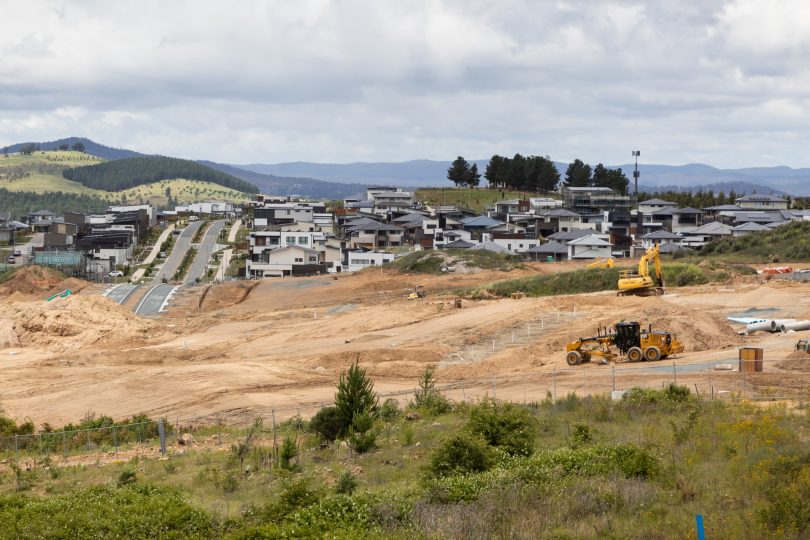
Residential development at Denman Prospect in the Molonglo Valley. Photo: Michelle Kroll.
New home buyers are facing delays and price increases as builders cope with mounting materials and labour shortages in the midst of a housing and infrastructure boom.
They are being warned to expect budget blowouts and extended completion dates while builders see their profit margins wiped out by rising costs.
Industry sources say it is a perfect storm whipped up by the impacts of the pandemic on global supply chains and the white-hot demand for housing driven by record low-interest rates.
On the ground, it means a scramble for materials as builders try to secure supplies, with reports of orders being gazumped by those willing to pay more.
Some builders are revising or even rescinding contracts to stay ahead of the wave of price increases and there are fears that some might not survive.
One of Queensland’s largest residential builders, Privium Group, faces a $28 million collapse amid warnings of a profitless boom.
Master Builders ACT CEO Michael Hopkins said the construction industry was facing a serious issue with a combination of soaring prices, delivery delays and labour shortages.
Mr Hopkins said members had reported dramatic price increases from suppliers this year, which in some cases have been more than 30 per cent.
“Initially, we heard about shortages of timber, then shortages and price increases for steel,” he said.
“But we’re now hearing that most building products are experiencing price increases and shortages including glass, windows, insulation, as well as timber and steel.”
That means new builds and renovations will take longer and cost more, and he urged people to discuss the situation with their builders.
“What we’re seeing is that these cost increases are pretty well consuming the profit margin and, in some cases, making projects unviable,” Mr Hopkins said.
“That’s why we were so critical of the ACT Government’s off-the-plan sales restrictions introduced last week because it shows that the government doesn’t understand what’s happening in the construction industry at the moment.
“In some cases, actually going back to the drawing board, revisiting the design, maybe seeking an amended or new development application, is a reasonable solution.”
Mr Hopkins said the lockdown had already devastated small businesses, and now they were being hit by this.
Business closures may not happen immediately, but by the second half of next year, the pressures could drive some to the wall, and they might not just be the smaller operators.
“We’re finding this is impacting the very largest to the smallest contractors,” Mr Hopkins said.

Master Builders ACT CEO Michael Hopkins: “What we’re seeing is that these cost increases are pretty well consuming the profit margin and, in some cases, making projects unviable.” Photo: File.
He said industry was working closely with the federal government to identify and clear supply chain blockages, and with the ACT Government so it understands the impact this will have on its own infrastructure program and the issues local builders are facing.
Mr Hopkins warned the ACT was particularly vulnerable to labour shortages because of intense national competition for skilled workers and the fact that the lockdown forced many construction workers on ACT projects to return home.
He again called on the ACT Government to lift its support for apprentices.
“We also know that the ACT is the lowest of any state and territory for subsidies for construction apprentices,” he said.
“We’re very concerned that the long history of under-investment by the ACT Government in training and skills is going to slow the economic recovery in 2022.”
Civium’s director of project sales Matt Nicholls said he had never seen a situation like this before.
He said builders were faced with price increases such as steel being up 10 per cent, concrete reinforcement 20 per cent and timber 25 to 30 per cent, and unless they were locked into contracts that had to be passed on to the home buyer. Some were absorbing what they could, but others would be taking a loss, Mr Nicholls said.
He said this was being exacerbated by delays of up to 12 weeks – “and that’s a lot of money when you’re holding the land” – translating to completions overdue by three months or longer, on average.
“I know a builder who paid upfront for steel and lumber three or four months ago and they’re still waiting,” he said.
“We’re dealing with developers who have delayed their release until February next year to make sure they can get enough stuff and get going.”
In the new suburb of Whitlam, house and land packages that were marketed six months ago at $1.1 million are now $1.4 million.
Mr Nicholls said there would have to be some give and take from both the client and builder in the current situation.
There was hope that with borders reopening, the supply chain would start to clear, but both Mr Hopkins and Mr Nicholls expected issues to persist well into 2022.
Original Article published by Ian Bushnell on Riotact.













